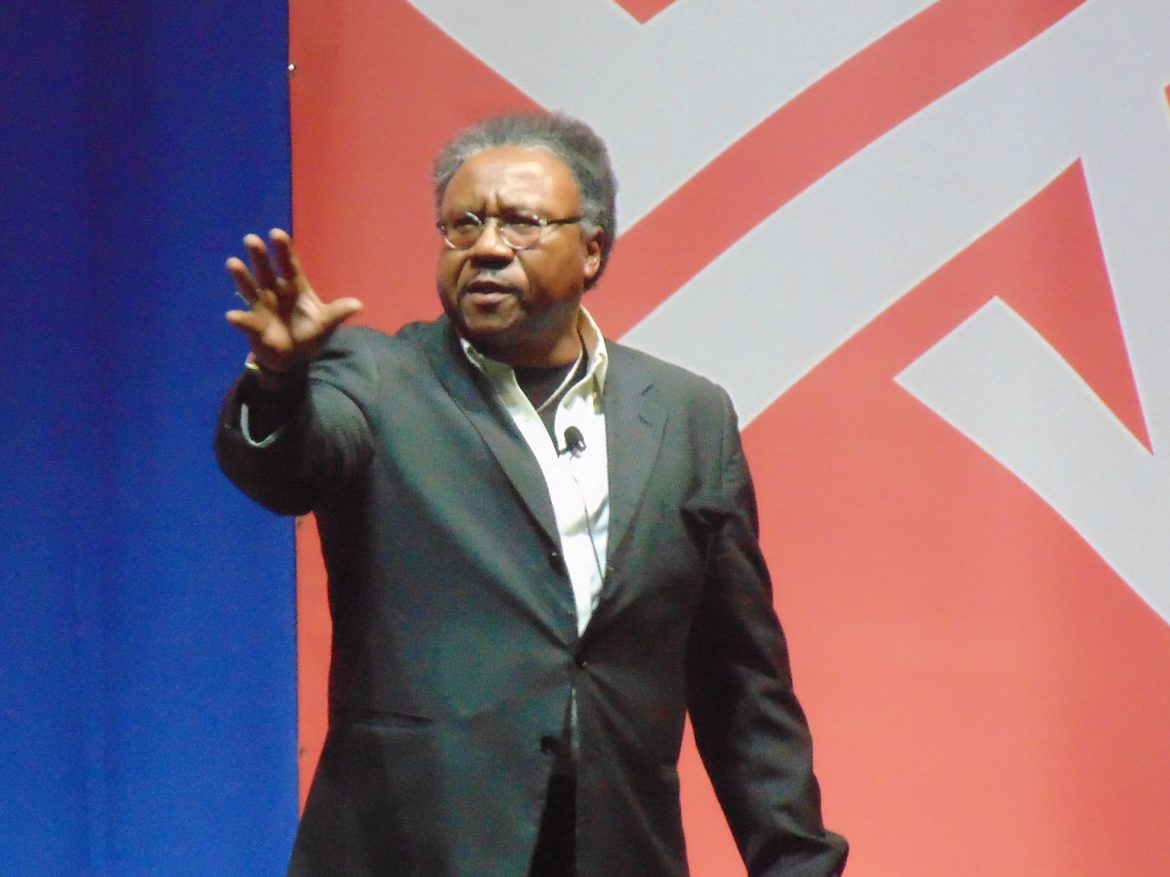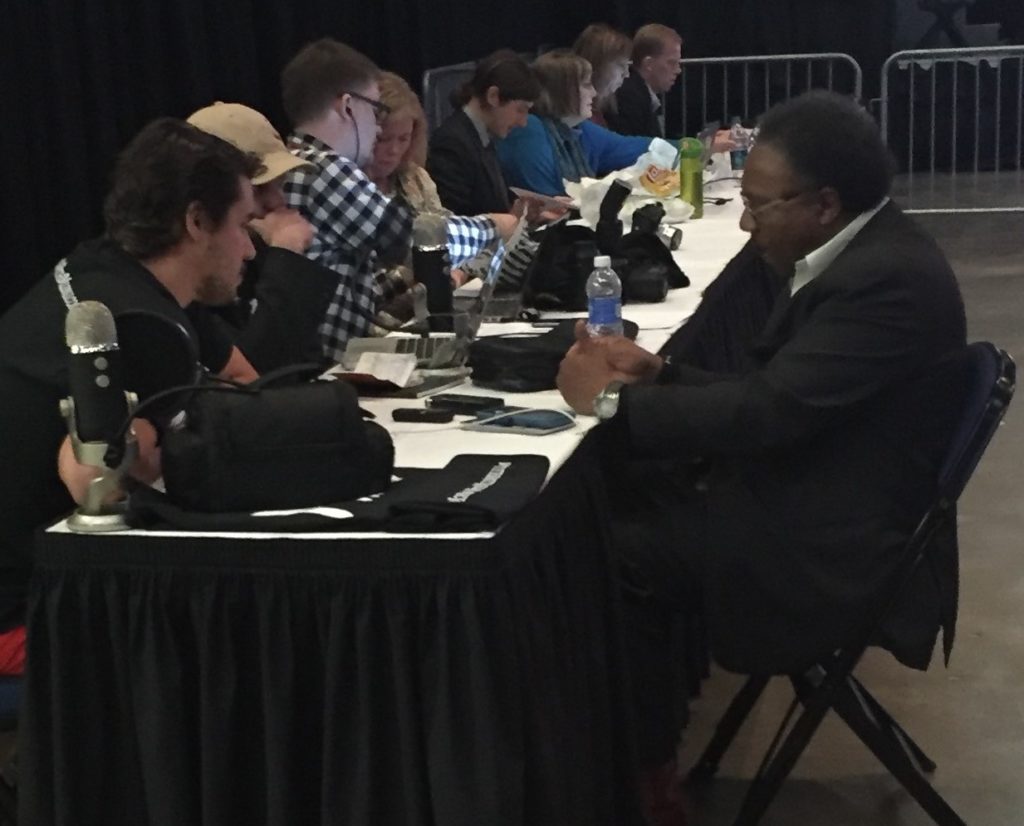A crowd of nearly two thousand gathered in Cedar Rapids, Iowa, Saturday for the Rising Tide Summit. The Summit was co-hosted by FreedomWorks, a conservative and libertarian advocacy group based in Washington D.C., and Iowa’s U.S. Congressman Rod Blum. As FreedomWorks CEO Adam Brandon noted, “Republican presidential debates have been more about personalities and pitting candidates against each other than about actual policy. This is a vetting process for the Presidency, not a reality TV show. We wanted to do something different and unique with the Rising Tide Summit. The grassroots activists who have joined us today want to hear what these five candidates have to say about their plans to get the economy moving again through pro-growth, free market policies.”
Those in attendance heard from five GOP candidates–Carly Fiorina, former Senator Rick Santorum, Senator Ted Cruz, Dr. Ben Carson, and Senator Rand Paul–as well as from a handful of other speakers, including FreedomWorks Senior Economic Contributor Stephen Moore, focusing on the economic issues facing our nation. While the economy was the main theme of the day, one speaker chose to focus on a related issue impacting countless Americans–Criminal Justice Reform.
Criminal Justice Reform (CJR) gained national attention following the October introduction of the Sentencing Reform and Corrections Act, sponsored by Senator Chuck Grassley (R-Iowa, Chair of the Judiciary Committee), with bipartisan support from Sens. Cory Booker (D-N.J.), John Cornyn (R-Texas), Dick Durbin (D-Ill.), Patrick Leahy (D-Vt.), Mike Lee (R-Utah), Charles Schumer (D-N.Y.), Tim Scott (R-S.C.) and Sheldon Whitehouse (D-R.I.). A few key tenets of the bill are to grant judges greater discretion in sentencing (currently a third drug offense is punishable by a mandatory sentence of life without parole), to target violent versus nonviolent offenders, and to shift the focus from incarceration to re-habilitation including substance abuse counseling and job training. CJR addresses over-incarceration concerns while still targeting the worst offenders.
The Reverend CL Bryant–Baptist pastor, radio host of The CL Bryant Show, motivational speaker, creator of the Runaway Slave Movie, and FreedomWorks Senior Fellow–is passionate about Criminal Justice Reform. I sat down with him before the event to get his perspective. The following is an excerpt of that interview.
Bobbi: Historically, criminal justice has been seen as an issue of justice versus mercy. Conservatives are usually thought of as punitive while liberals are considered compassionate. How do you challenge those perceptions?
Rev Bryant: We are looking at the most humane, family saving, anti-incarceration design that I believe has been launched in America, and that is Justice Reform. There are many people on the Hill, of both parties, who know that something must be done. When we look at our incarceration rate in this county and we understand that we incarcerate more people in this country than are incarcerated in the world, then we know with common sense that something has to be done.
Republicans are leading that charge. Regardless of what we’ve been labeled in the past, there is no question that this is an issue of fiscal responsibility. We’re spending thirty thousand dollars per inmate, on average, per year, to keep them in jail. Now this is the thing we have to understand. Nearly half of the incarcerated people in this country are there for nonviolent offenses. So, how do we empty our jails? We must reform the mandatory sentencing.
Bobbi: Do you think the mandatory minimums are a big part of the problem?
Rev. Bryant: Absolutely it is. What we have done is tied the hands of judges. Judges in so many cases must put people in jail to look tough on crime, according to the law. And our politicians have done that to us. So we have to back up off of that.
Bobbi: One of our Iowans, Grassley, introduced a bill, and part of it was to give flexibility to judges so they can override mandatory minimums and do what they think is prudent versus what is prescribed.
Rev. Bryant: Exactly right. And the prescription has failed us. Another thing we want to look at is something called Civil Assets Forfeiture, where your property, whether it’s your money that someone confiscates from you–if you have $5,000 on you or $10,000 and you’re stopped by police, all of a sudden you have to answer for why you have this money. And if your answer is not adequate, or even if it is, for their discretion, and they decide to seize your money until they can check your story out, your money becomes the criminal. They don’t arrest you–they take your money. And they can also do this to your property. So many people do not understand the doors this opens up for the heavy hand of government to walk all over American citizens. This is not American. This is something that leads us to the heavy hand and the jackboot foot of tyranny. That’s what happens.
Bobbi: Along the lines of recidivism, [for] those who have treatment or therapy or job training, or some combination, the recidivism rate is lower than strictly incarceration?
Rev. Bryant: Exactly right.
Bobbi: So is that part of the goal, too?
Rev. Bryant: Exactly right. Texas and Georgia are prime examples of this. You teach a man how to weld, you teach him a trade, you teach him how to be a good parent–and those things must be taught these days because younger people are not picking them up from their parents– So you teach that kid a skill that he can make money for himself, believe it or not, there is pride and self-satisfaction in that.
Bobbi: Talking about the money and the expense for things…I believe in Texas the money that was earmarked to build additional prisons was instead going to be used for treatment/training…I know that fiscal conservatives have asked, “Where are you going to get the money to pay for the training and such?”
Rev. Bryant: Exactly. I believe it is Texas that saved the taxpayer almost a billion dollars by reforming the human being and reforming the justice system. And that’s what all of us can look forward to, if we do it sensibly.
Bobbi: Thank you, very much.
Rev. Bryant: Thank you.
- 2123: Sentencing Reform and Corrections Act of 2015 was introduced October 1. Since then it has been reviewed by committee, which issued a report to the full chamber on October 22 recommending that the bill be considered further. (Only about 1 in 4 bills are reported out of committee.) It is currently awaiting House and Senate approval.



2 comments
Doug, I agree in concept. The problem is that often times minor offenses are the precursor to major crimes with victims. Based on my LEO experience, I also worry about some judges being afforded more leeway. As we have all seen, this has sometimes resulted in some pretty horrific outcomes. I agree in therory with your points…but, I wonder if they will result in bigger losses in the long run.
It IS time to reform our system of mandatory sentences for non violent crime. House arrest can save our tax dollars; probation for minor offenses could be an option. Give our judges more leeway; after all, they're judges.